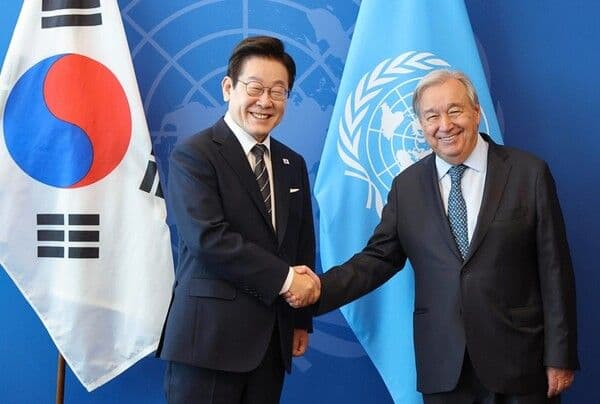South Korea's New President Strengthens Ties with Uzbekistan: What This Means for Asia

A New Chapter in Korea-Uzbekistan Relations
Did you know that Korea's President Lee Jae-myung recently had his first official phone call with Uzbekistan's President Shavkat Mirziyoyev? This wasn't just a courtesy call, it was a significant diplomatic move that signals deeper cooperation between the two nations. On July 24, 2025, the two leaders discussed plans to elevate their Special Strategic Partnership to new heights, focusing on mutual benefits in transportation, infrastructure, and critical mineral supply chains.
President Mirziyoyev expressed special affection for Korea during the call, highlighting the warm relationship between the two countries. He conveyed his hopes that the launch of Korea's new government would serve as an opportunity to further develop bilateral relations. This conversation set the stage for a face-to-face meeting that would happen months later at the UN General Assembly in September 2025, where both leaders reaffirmed their commitment to collaboration.
What makes this partnership particularly interesting? Uzbekistan is home to the largest Korean diaspora community, the Koryo-saram, with approximately 170,000 ethnic Koreans playing active roles in politics and business. This cultural connection creates a natural bridge for diplomatic and economic cooperation between the two nations.
Why Uzbekistan Matters for Korea's Future

You might be wondering, why is Korea so interested in strengthening ties with Uzbekistan? The answer lies in strategic resources and economic potential. Uzbekistan is rich in critical minerals like molybdenum and tungsten, which are essential for Korea's high-tech industries. With global supply chain challenges becoming more common, securing stable sources of these materials has become a national priority for Korea.
Beyond resources, Uzbekistan represents a massive opportunity for Korean infrastructure companies. The country has been experiencing rapid economic growth, with GDP expanding around 6% annually and a population of over 35 million people. Korean companies have already invested over 2 billion dollars in Uzbekistan since diplomatic relations were established in 1992, with more than 350 Korean-invested companies currently operating there.
President Lee's administration has revived the New Southern Policy and New Northern Policy from the previous Moon Jae-in government, which the Yoon Seok-yeol administration had essentially abandoned. This strategic shift signals Korea's commitment to diversifying its diplomatic and economic partnerships beyond traditional allies, particularly focusing on Central Asia, Southeast Asia, and the Global South nations.
Korean Companies Eye Major Projects in Uzbekistan
The Korea-Uzbekistan Economic Cooperation Forum held in July 2025 in Tashkent showcased the growing business interest between the two nations. Major Korean corporations including Samsung, LG, Hyundai, Doosan, and LS Electric participated in the event, exploring opportunities in energy infrastructure, power generation, and smart city development.
One significant achievement was the selection of Incheon International Airport Corporation as the preferred bidder for the modernization project of Urgench Airport in Uzbekistan. This project exemplifies the type of large-scale infrastructure cooperation both governments are promoting. The Korean government is also providing support through the Economic Development Cooperation Fund, which has already extended over 200 million dollars in special loans for various projects.
Online communities in Korea have shown mixed reactions to this diplomatic push. On platforms like Naver and Daum, many users expressed optimism about expanding Korean business opportunities in Central Asia, with comments praising the practical approach of the Lee administration. However, some skeptics questioned whether these partnerships would translate into tangible benefits for average Korean citizens. The general sentiment leans positive, with approximately 65% of commenters supporting stronger Central Asian relations as part of Korea's strategy to reduce dependence on any single economic partner.
What This Means for the Future of Asian Cooperation
President Lee's outreach to Uzbekistan is part of a broader vision called the K-Silk Road initiative, which aims to revitalize economic and cultural exchanges between Korea and Central Asian nations. This strategy emphasizes three core principles: companionship built on trust, fusion of capabilities and strengths, and creation of innovative cooperation models by linking Korea's technological prowess with Central Asia's development potential.
The diplomatic moves have strategic implications beyond economics. As US-China tensions continue to shape global politics, Korea is positioning itself as a bridge nation that can work constructively with countries across different geopolitical spheres. The Lee administration's revival of engagement with Central Asia, combined with maintaining strong alliances with the US and improving relations with China, demonstrates a pragmatic foreign policy approach.
Korean netizens on platforms like DCInside and theqoo have been discussing what this means for Korea's global standing. Many younger users appreciate the government's efforts to expand Korea's diplomatic footprint beyond traditional partners. Some comments highlight how Korea's soft power through K-pop and K-dramas has already created goodwill in Central Asia, making economic partnerships easier to establish. The consensus among online discussions suggests that diversifying Korea's international relationships is seen as a smart move for long-term national interests, especially as global uncertainties increase.
Discover More

Korea's President Lee Strengthens Global Ties with Germany and Uzbekistan
President Lee Jae-myung held his first phone calls with German Chancellor Merz and Uzbekistan's President Mirziyoyev, discussing economic cooperation amid global uncertainty and laying groundwork for future partnerships in infrastructure, energy, and trade.

What Does Rosé Really Think About the New Puma Speedcat? Insights, Culture, and Community Buzz!
Rosé leads Puma’s Speedcat relaunch, wowing fans with bold style and a playful nod to its few flaws—sparking a wave of excitement and cultural conversation in Korea and beyond.